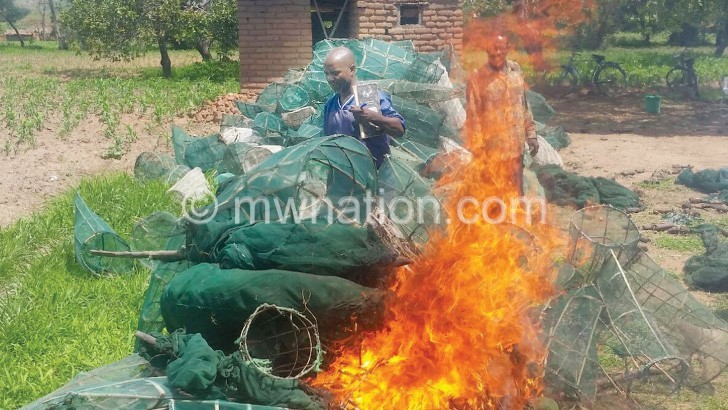Banned fish traps go up in smoke
Sunrays were ruthlessly searing as curls of smoke spiralled into the sky, emitting fumes of burning mosquito nets. For almost an hour, witnesses of the destruction of probably the largest stack of unwanted fishing equipment burned by Lake Chilwa fanned their nostrils and gasped for fresh air.
“You may not like this, but we have to burn them,” Senior Chief Chiwalo declared as the blackish smoke thickened. “We must end this disgrace for our children’s sake. We are sick and tired of fishing methods wiping out fish in our lake.”
As the traditional leader struck the first match, he raved like a warrior determined to throw a blow and liberate his territory from an arrogant aggressor. He cared little about by-laws that forbid use of mosquito nets for fishing without stating how to dispose of what they confiscate.
The fiery flames shined the light on the rising war on unwanted fishing techniques. Interestingly, the fishing population opted against what the traditional leader almost reduced to “just a symbolic ceremony” to avoid unnecessary lawsuits.
One by one, the beach villagers hurled all the 362 basket-like fish traps draped in State-sponsored mosquito nets on fire.

As flames were reducing the confiscated fishing props to ash, Mustafa Maulana, who led a 10-man patrol team that seized the pile two weeks ago, was not entirely pleased.
“This is supposed to be a happy day because burning sends a strong warning to destructive minds, but the major worry is that thousands more of these are still in use,” he said in an interview.
The inroads mirror a growing enthusiasm to safeguard the vanishing fish species in the salty lake which supports the livelihoods of nearly one million people, including fishers and fish mongers.
Sadly, fishing, which injects about $18.7 million into the local economy every year, is under threat as fish is fast disappearing due to overfishing, falling water levels and use of unsustainable fishing means.
According to assistant fisheries officer Bernard Kameko, chambo, matemba and milamba are the most endangered species.
“It is estimated that the lake loses 10 percent of its fish population every year and that is scary. The next generation may inherit an empty lake,” he explained.
The Department of Fisheries estimates matemba catches alone have tumbled from nearly 7 000 tonnes in 2000 to slightly over 2 000 tonnes by 2009.
Kedson Mwanopa, 38, who has been fishing on Lake Chilwa since he was 10, says the loss could be graver.
The father-of-three owns 38 fishing nets, but says many are the days he comes home almost empty-handed.
Maulana and his team said falling catches are the reason they did not protest when village heads asked them to intervene. On the community-led mission, the barefoot patrollers’ legwork entailed lengthy travels on thorny and rocky footpaths, working all day without food or pay.
Their walks from Nang’ona on the edge of Mpoto Lagoon to Njalo Island, Namikombwe and Nkholonje along Lake Chilwa, the patrol team impounded 147 fish traps covered with mosquito nets as well eight lengthy fishing nets.
The stack confirmed how scarcity of fish has pushed fishers to resort to nets with finer mesh.
This has led to massive misuse of mosquito nets distributed to combat malaria infections.
The most worrisome fishing instruments made of these State-sponsored nets intended to roll back the highest killer of children and pregnant women is the homemade basketry named Nampeya.
It resembles mono, a basket-like trap traditionally made of bamboo sticks and grass.
The communities on the shoreline of Lake Chilwa have christened the design clothed in anti-malaria nets Nampeya after a small village in Machinga from where it originated five years ago.
Mwanopa likened Nampeya to a gun easy to assemble, saying anyone can make and use it.
He lamented: “It’s a deadly weapon in the hands of fishers desperate for better catches. When they block water to set the trap, it catches even small fish and eggs. It does not give fish a chance to grow and multiply.”
How to eliminate Nampeya was a major talking point when beach village committees met with councillors, traditional leaders and other thought leaders in October.
Chiwalo stunned those in attendance by turning down a proposal to deploy armed police officers to watch over the lake and seize destructive gear, giving his people the power to bring the change they need.
The burn could be a result of rising community awareness buoyed by the Lake Chilwa Basin Climate Change Adaptation Programme.,
Leadership for Environment and Development (Lead) chairperson Professor Sosten Chiotha, who coordinates the programme, saluted the fishing communities for taking action to save the fish for the future.
“The collective decision to destroy the unwanted fishing gears shows the locals are aware of the challenge and not afraid to take the bull by the horns. We gave them information and we are happy what they have learnt for the past five years is bearing fruit,” said Chiotha.
Equally gushing was Yanira Mtupanyama, the chief director in the Ministry of Natural Resources, Energy and Mining.
“It’s shocking that this is happening when the lake is closed to allow fish to multiply. I’m sure the burning will send a message that this is over,” she said.
But overfishing will continue until indiscriminate fishing tools are no longer being fashioned and in use, Maulana warned.
“We must wipe out these weapons before they wipe out our fish,” the member of Chiwalo beach village committee said. n





